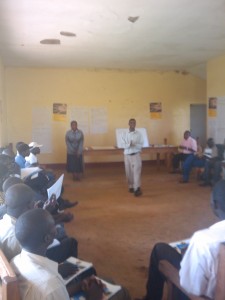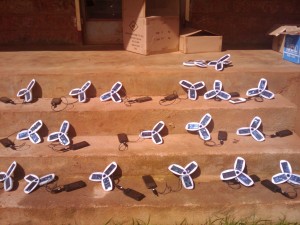In early 2009, Grameen Foundation went to Uganda with the idea of creating a fluid and effective two way communication channel between rural farmers

CKWs in training
and the world of agricultural experts, development agencies, traders and commercial players. Through this loop, rural small holder farmers would be given livelihood saving agricultural information generated by the experts and the big players would keep informed on conditions on the farm from adoption of best practices to available produce for sale.
If you know much about agricultural extension services in rural Africa, you could have called such a ambition, well, ambitious. Traditionally, taking agricultural extension services to these farmers who live in far and hard to reach places is slow, expensive and inefficient because it is riddled with bottlenecks such as poor or no road infrastructure and few extension workers spread thin over vast areas.
Grameen Foundation’s technology center had a plan – harness the power of the mobile phone, a technology that is oblivious to such bottlenecks and combine it with a network of human intermediaries that can be trained to fully leverage its capabilities for the benefit of the farmer. The Community Knowledge Worker concept was thus born but would it work? That remained to be tested.
In nine months of testing the concept, Grameen Foundation built recruited, retained, and provided ongoing training, support, and monitoring to 38 Community Knowledge Workers operating in two districts. The foundation partnered with 7 organizations to pool expert agricultural information onto a central database and was commissioned by three organizations, including the World Food Program, to collect grassroots data on farm conditions. Together with MTN Uganda, the country’s leading mobile network operator, the foundation prototyped, tested and deployed eight mobile applications to deliver information to and from rural farmers.
The result of all these intricacies? The network of 38 community knowledge workers reached rural farmers in more than 14,000 instances either providing information to them or interviewing them for surveys commissioned by leading players in agriculture. That is; more than 8,000 times, a farmer received livelihood improving information such as organic agricultural tips and advice developed using local knowledge, agronomic best practices as prescribed by experts, market opportunities and market prices, location and contact numbers for agricultural input dealers. On the other hand, institutional agricultural players touched based with more than 6,000 rural farmers on such crop disease incidence, potential to supply to lucrative markets like WFP and farmer’s knowledge of disease control methods.

Google G1's charging up
From the promising results of the test of concept and guided by the insights got, Grameen Foundation is moving ahead to expand this network of community knowledge worker to reach the rest of the country. Here in the Community Knowledge Worker, the foundation shares some of the lessons learned on what it takes to sustainably build and expand such a network of information intermediaries.
Posted by: Lydia Namubiru, CKW Partnership Analyst
Tags: AppLab, CKW, Communication, Community Knowledge Worker, Farming, Gates Foundation, Grameen Foundation, ICT4D, ICTI, Innovation, Mobile, research, Technology, Uganda


Fantastic vision and use of technology, are there efforts at the productization and commercialization of the technology so it can be self sustaining?
Best regards,
Jeremiah